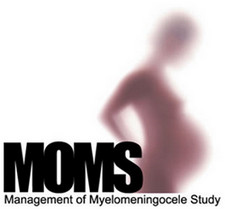NICHD Seeking Pregnant Patients Carrying a Baby Diagnosed With Spina Bifida for a Clinical Trial Known as the Management of Myelomeningocele Study (MOMS)
 Spina bifida, which literally means "split spine," is a complex birth defect that affects three to four out of every 10,000 live births. It occurs when part of the spinal column—which includes the spinal cord, associated nerves, spinal bones, and overlying muscle and skin—does not fully develop or close completely. The most frequent and severe form of spina bifida is called myelomeningocele, which is one of the most common birth defects causing lifelong disability.
Spina bifida, which literally means "split spine," is a complex birth defect that affects three to four out of every 10,000 live births. It occurs when part of the spinal column—which includes the spinal cord, associated nerves, spinal bones, and overlying muscle and skin—does not fully develop or close completely. The most frequent and severe form of spina bifida is called myelomeningocele, which is one of the most common birth defects causing lifelong disability.
Myelomeningocele occurs when parts of the spinal cord and nerves come through the opening or area of incomplete development in the spinal column. In addition to paralysis and problems with nerve function, many infants with myelomeningocele experience other medical problems, such as too much fluid around their brains (called hydrocephalus) as a result of the fluid not draining correctly. The pressure from the fluid can cause additional brain and nerve damage.
Surgery to close the opening in the spinal column is the first step in treating myelomeningocele. For decades, the standard of care has been to perform this surgery immediately after birth (postnatally). In recent years, a small group of surgeons has developed this operation for spina bifida so that it can be performed prenatally, or before birth, while the baby is still in the womb. It is possible that the prenatal surgery may provide benefits to babies with spina bifida, such as helping to stop nerve damage from progressing throughout the pregnancy. However, there are risks associated with prenatal surgery, including an increased chance of delivering prematurely.
The NICHD initiated the Management of Myelomeningocele Study (MOMS) to understand which treatment—the standard postnatal surgery or prenatal surgery—is more effective in treating myelomeningocele and for improving short- and long-term outcomes for those with the condition.
"Pregnant women who take part in MOMS have a unique opportunity to get the best possible care for their own babies, while also helping thousands of other babies," said Cathy Spong, M.D., chief of the NICHD’s Pregnancy and Perinatology Branch, which funds the study. "Their participation is crucial to getting scientific evidence about which treatment provides the better outcomes."
Women who are interested in taking part in MOMS will need to meet specific criteria to qualify for the study. The surgery, either prenatal or postnatal, will be conducted at one of three locations across the country:
- University of California, San Francisco (California)
- The Children's Hospital of Philadelphia (Pennsylvania)
- Vanderbilt University Medical Center (Tennessee)
Travel and housing arrangements for the woman and her partner or other support person will be paid for by the study. Medical costs are covered, except for those the woman would normally have for obstetrical care and delivery, given that she is carrying a baby with spina bifida.
If you are interested in learning more about MOMS, contact the Study Coordinator at (toll free) 1-866-ASK-MOMS (1-866-275-6667) or at moms@biostat.bsc.gwu.edu. The Coordinator will answer any questions you, your family, or your doctor might have about the study and its requirements and will explain the study in more detail before you decide about participating.
Women who are thinking about getting pregnant or who are in early pregnancy can also reduce the risk of spina bifida and other birth defects by getting enough folic acid. The U.S. Public Health Service recommends that women of childbearing age get at least 400 micrograms of folic acid every day, through food and/or supplements. Health care providers often recommend supplementing the diet with folic acid for three months before getting pregnant, and for at least the first three months of pregnancy to reduce the chance of spina bifida and other birth defects.
For more information on MOMS, visit the following resources:
- Management of Myelomeningocele Study (MOMS) Web site

- clinicaltrials.gov: Management of Myelomeningocele Study (MOMS) (ID NCT00060606)
- YouTube Video about MOMS
 (Produced by Children’s Hospital of Philadelphia)
(Produced by Children’s Hospital of Philadelphia) - Spina Bifida Association: Women Carrying Babies with Spina Bifida Should Consider MOMS

- NIH Podcast Advises Women On How to Achieve a Healthy Pregnancy
Originally posted: August 24, 2010

 BACK TO TOP
BACK TO TOP